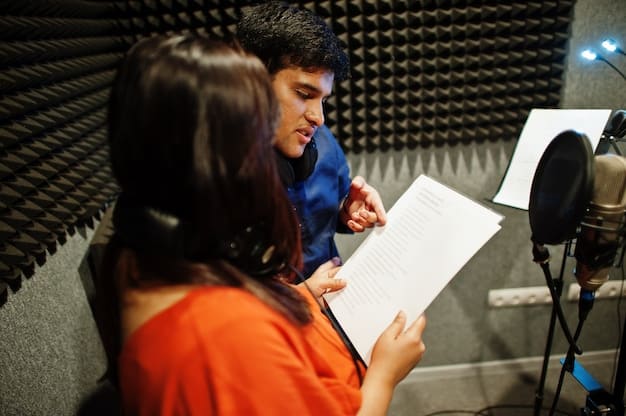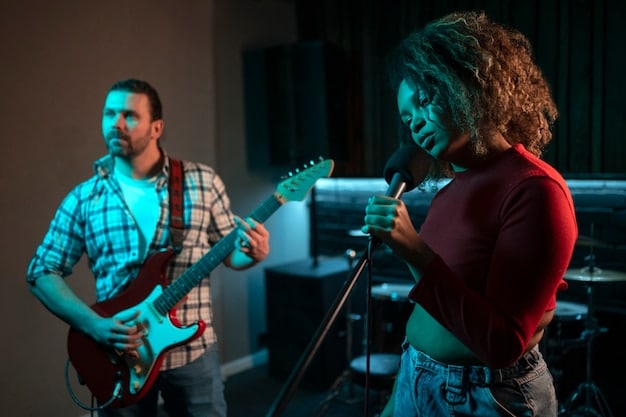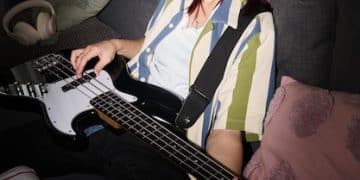Band Interview Checklist: Maximize Impact in 7 Steps

Maximize the impact of your band interviews by following this essential checklist, covering pre-interview preparation, effective during-interview techniques, and crucial post-interview follow-up steps for lasting impressions and successful promotion.
Nailing a band interview can significantly boost your visibility and connect you with fans. This band interview checklist: 7 things to do before, during, and after to maximize impact ensures you’re fully prepared to make the most of every opportunity.
Before the Interview: Setting the Stage for Success
Preparation is key to a successful band interview. Take the time to thoroughly research the interviewer and the publication or platform they represent. This will help you tailor your responses and ensure you’re addressing the interests of their audience.
Research the Interviewer and Publication
Knowing your audience is as important as knowing your music. Understanding the interviewer’s style and the publication’s readership allows you to craft answers that resonate.
Define Your Key Talking Points
What message do you want to get across? Identify three to five key points you want to emphasize during the interview. These could be about your latest album, upcoming tour, or the band’s overall philosophy.
- Craft concise statements: Prepare memorable soundbites that journalists can easily quote.
- Practice your delivery: Rehearse your talking points to ensure a confident and engaging delivery.
- Anticipate potential questions: Think about the questions you’re likely to be asked and prepare thoughtful answers.

By taking the time to plan and prepare, you’ll be able to approach the interview with confidence and deliver a compelling message.
During the Interview: Engaging and Connecting
The interview itself is your opportunity to shine. Be professional, enthusiastic, and genuine. Remember, the interviewer is not just looking for information; they’re looking for a story.
Listen Actively and Answer Thoughtfully
Pay close attention to the interviewer’s questions and take a moment to formulate your response. Avoid rambling and focus on providing clear, concise answers.
Be Authentic and Engaging
Let your personality shine through. Share anecdotes, use humor (where appropriate), and be passionate about your music.
- Maintain eye contact: Connect with the interviewer on a personal level.
- Be mindful of your body language: Project confidence and enthusiasm.
- Avoid jargon and technical terms: Use language that everyone can understand.
By being present, engaging, and authentic, you’ll create a memorable interview that leaves a positive impression.
Navigating Tricky Questions with Grace
Inevitably, you may encounter questions that are difficult or uncomfortable. The key is to remain calm, professional, and avoid getting defensive. Prepare strategies to navigate these situations with tact and honesty.
Acknowledge the Question Without Getting Trapped
Start by acknowledging the question or concern before pivoting to a more favorable or neutral topic. This shows you’re not avoiding the issue but also allows you to control the narrative.
Redirect to Your Key Talking Points
Use the opportunity to steer the conversation back to your prepared key messages. This allows you to address the core of what you want your audience to know, regardless of the initial inquiry.
- Maintain a professional demeanor: Always remain polite and respectful, even if you disagree.
- Avoid defensiveness: Getting defensive can make you appear guilty or untrustworthy.
- Be honest but strategic: Share what you can without divulging confidential information or damaging relationships.
By handling tricky questions with poise, you can maintain a positive image and steer the conversation toward your desired outcomes.
Crafting Memorable Anecdotes and Stories
Personal stories and anecdotes enhance interviews by making them more engaging and memorable. Share experiences that illustrate your passion, the band’s journey, or the inspiration behind your music.
Show, Don’t Just Tell
Instead of simply stating facts, use storytelling to bring your points to life. Describe scenes, characters, and emotions to create a vivid picture for the audience.
Relate Stories to Your Core Message
Ensure your anecdotes support your key talking points. Each story should reinforce the messages you want your audience to remember.
- Practice your storytelling skills: Rehearse anecdotes to ensure they flow well and are timed effectively.
- Keep stories concise: Aim for brevity to maintain audience attention.
- Focus on emotional connection: Stories that evoke emotions are more likely to resonate with listeners.

By weaving personal stories into your interviews, you can create a lasting connection with your audience, making your message more relatable and memorable.
Post-Interview: Maximizing the Opportunity
The interview doesn’t end when the recording stops. Follow-up and promotion are vital to maximizing the impact of your media appearance. Send a thank you note to the interviewer, and share the interview on your social media channels.
Send a Thank You Note
Express your gratitude to the interviewer for their time and interest. This simple gesture can go a long way in building relationships.
Promote the Interview on Social Media
Share the interview link on all your social media platforms and encourage your fans to check it out. Use engaging captions and relevant hashtags to reach a wider audience.
- Tag the interviewer and publication: Increase visibility and show your appreciation.
- Engage with comments and feedback: Respond to questions and comments from fans.
- Track your results: Monitor views, shares, and engagement to measure the impact of the interview.
By following up and promoting the interview, you can extend its reach and influence, solidifying your brand and connecting with a broader audience.
Building Long-Term Media Relationships
Nurturing relationships with journalists and media outlets is essential for sustained media coverage. Treat every interaction as an opportunity to build trust and credibility.
Be Responsive and Reliable
Respond promptly to media inquiries and always deliver on your promises. Being reliable makes you a valuable source.
Offer Exclusive Content
Provide journalists with exclusive content, such as behind-the-scenes photos or early access to new music. This gives them a unique angle and strengthens your relationship.
- Attend industry events: Network with journalists and media professionals at industry events.
- Stay in touch: Send occasional updates on your band’s activities and achievements.
- Respect their deadlines: Be mindful of journalists’ deadlines and provide information in a timely manner.
By investing in relationships with media contacts, you can establish yourself as a reliable and sought-after source, increasing your chances of securing future media coverage.
| Key Point | Brief Description |
|---|---|
| 🎤 Preparation | Research interviewer and publication; define key talking points. |
| 🗣️ During Interview | Listen actively, answer thoughtfully, and stay authentic. |
| 🚀 Post-Interview | Send thank you note and promote the interview on social media. |
| 🤝 Relationships | Build long-term media relationships by being responsive and reliable. |
Frequently Asked Questions
▼
Start by researching the interviewer and the publication. Understand their audience and tailor your key talking points to resonate with them. Practice your delivery to ensure confidence and clarity.
▼
Acknowledge the question without getting defensive. Redirect to your key messages and stay professional. Honesty is important, but be strategic in what you reveal to maintain a positive image.
▼
Sending a thank you note is a simple yet effective way to show your appreciation. It helps build rapport with the interviewer and can lead to future opportunities. It’s a matter of professional courtesy.
▼
Promote the interview on all your social media platforms. Tag the interviewer and the publication. Engage with comments and feedback from fans. Monitor your results with views, shares, and interactions metrics.
▼
Be responsive, reliable, and offer exclusive content to your media contacts. Attend industry events, stay in touch, and respect their deadlines. Building trust and credibility can lead to continued media coverage.
Conclusion
By following this comprehensive band interview checklist, you’ll be well-prepared to make a lasting impression, connect with your audience, and propel your band to new heights. Remember, preparation, authenticity, and follow-up are key to maximizing the impact of every interview.





